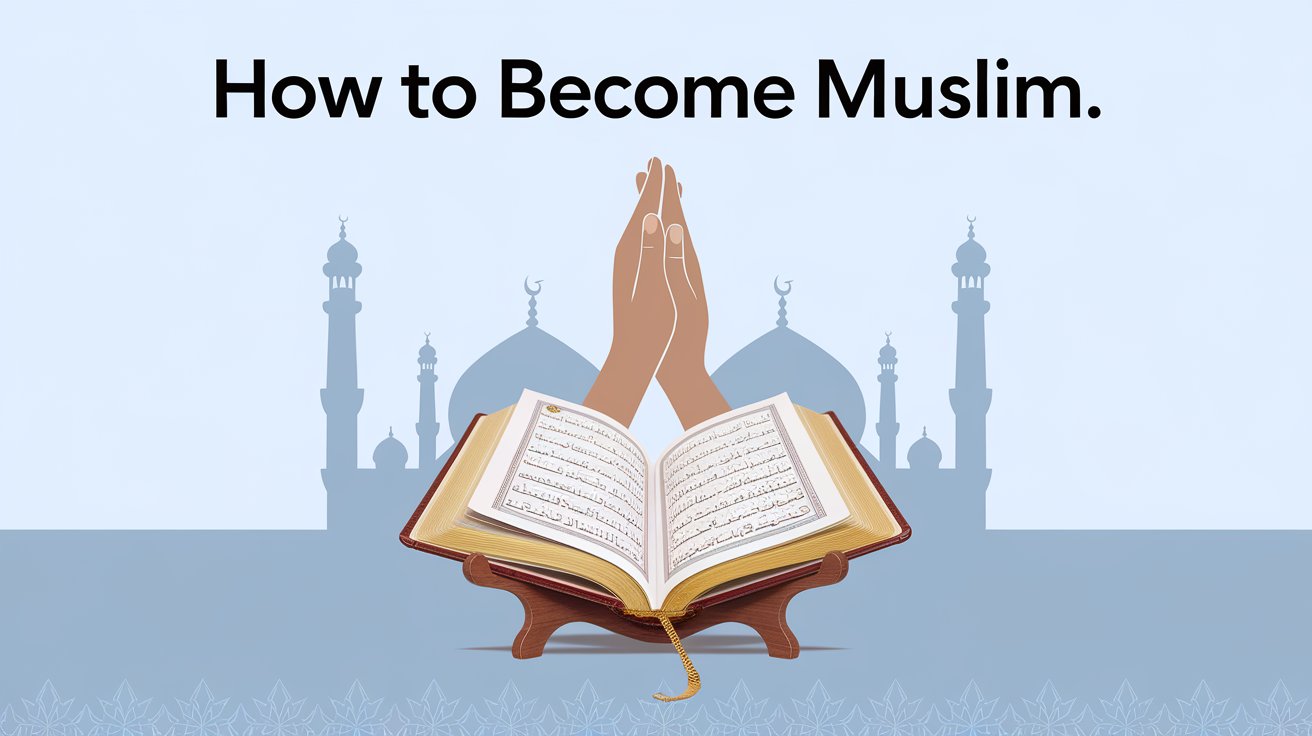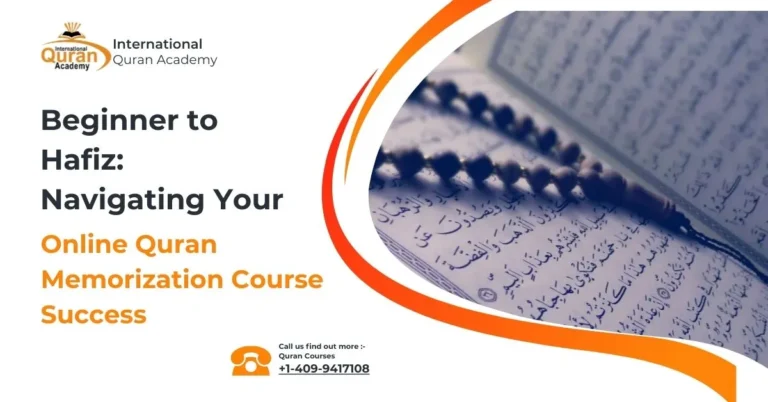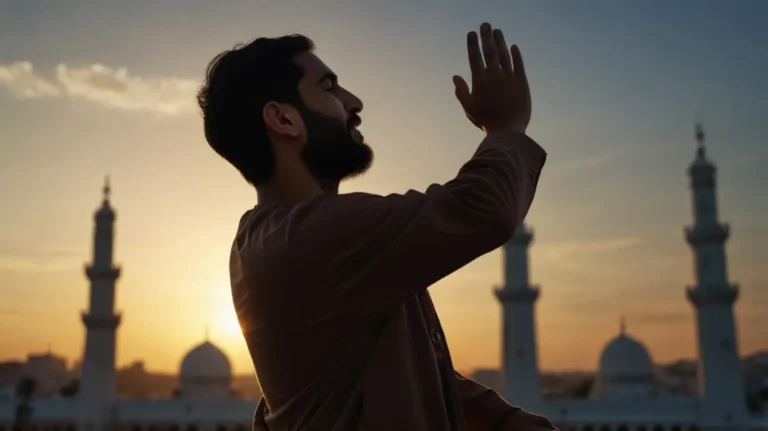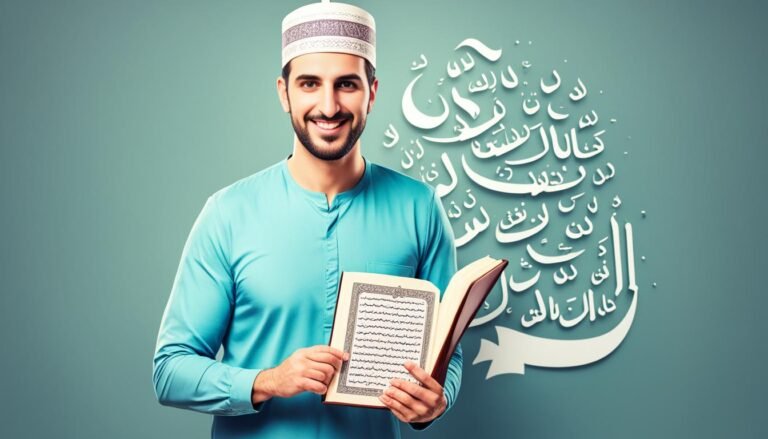Moving to Islam is a life-changing journey that starts with accepting Allah’s oneness. Every year, thousands of people choose to become Muslim, finding peace in Islamic teachings. This guide will walk you through the process of becoming Muslim, from taking your first steps to building a strong Islamic foundation.
The beauty of Islam lies in its simplicity – the core belief that there is only One God and Muhammad (peace be upon him) is His last messenger. Whether you’re just starting to learn about Islam or are ready to accept it, this guide will teach you everything you need to know about becoming a Muslim.
“Indeed, Allah loves those who turn to Him [in repentance] and loves those who purify themselves.” [Quran 2:222]
The Prophet Muhammad (peace be upon him) said: “Allah makes the way to Paradise easy for those who seek knowledge.” [Muslim]
Purpose of This Guide:
This guide helps you understand:
- Simple steps to become Muslim
- Basic Islamic beliefs and practices
- Daily Muslim life needs
- Where to find support
- Basic challenges and solutions
Starting with the fundamentals, we’ll go over everything from making your declaration of faith to starting your daily prayers to figuring out your place in the Muslim community. Remember, Islam welcomes people from all backgrounds, and there’s no compulsion in religion.
“And whoever seeks a religion other than Islam, it will never be accepted of him, and in the Hereafter he will be one of the losers.” [Quran 3:85]
How to Become Muslim
Becoming Muslim is a straightforward process. You don’t need to meet a scholar or mufti for accepting Islam. But for other issues maybe you will to need a scholar like how to read Quran and many more. The first and most important step is sincere belief in your heart.
To become Muslim, you need to believe that:
- There is only One God (Allah)
- Allah created everything
- We all will return to Allah
- Muhammad (peace be upon him) is the last messenger of Allah
If you truly believe this, you have accepted Islam. To declare your faith verbally, you can say both of the following declarations (Shahada).
The shorter version: “Lā ilāha illā-llāh, Muḥammadur-rasūlu-llāh”
(لَا إِلٰهَ إِلَّا الله مُحَمَّدٌ رَسُولُ الله)
Meaning: “There is no god worthy of worship except Allah, and Muhammad is the Messenger of Allah.”
Or the complete version: “Ash-hadu al-lā ilāha illā-llāhu waḥdahu lā sharīka lahu, wa-ash-hadu anna Muḥammadan ʿabduhu wa-rasūluhu”
(أَشْهَدُ أَنْ لَا إِلٰهَ إِلَّا الله وَحْدَهُ لَا شَرِيْكَ لَهُ وَأَشْهَدُ أَنَّ مُحَمَّدًا عَبْدُهُ وَرَسُولُهُ)
Meaning: “I bear witness that there is no god worthy of worship except Allah alone, who has no partners, and I bear witness that Muhammad is His servant and messenger.”
After saying both versions with understanding and conviction, you have officially become a Muslim. Welcome to the beautiful religion of Islam.
“Verily, this religion of Islam is easy, and no one makes it hard upon himself except that it overwhelms him.” [Bukhari]
What is Islam?
Basic intro to Islam
Islam means peace through submission to Allah. It’s the world’s second-largest religion. Allah sent Prophet Muhammad (peace be upon him) as the final messenger. The Quran is our holy book. Muslims follow five main duties called the Five Pillars.
“Indeed, the religion in the sight of Allah is Islam.” [Quran 3:19]
Who Muslims are
Muslims are people who believe in One God (Allah). We pray five times daily. Muslims live worldwide, from America to China. We follow the teachings of Prophet Muhammad (peace be upon him). Being Muslim means striving to be kind, honest, and helpful.
Prophet Muhammad (peace be upon him) said: “The best among you are those who have the best manners and character.” [Sahih al-Bukhari]
Why people choose Islam
People choose Islam for its clear message. Islam answers life’s big questions. It gives daily purpose and peace. Lots of people find comfort in direct connection with Allah. Because prayer is a direct connection with Allah. Islam’s logical teachings attract thinkers. The strong community support helps new Muslims grow. as for say allah in the Quran:
“Those who believe and whose hearts find comfort in the remembrance of Allah. Truly, in the remembrance of Allah do hearts find comfort.” [Quran 13:28]
Basic Beliefs
Belief in One God (Allah)
Allah is the Arabic word for The One True God. He is unique and unlike anything in creation. Allah created everything – every person, planet, and particle. He sees and knows everything, from the smallest ant to the largest galaxy. He doesn’t sleep or rest, and nothing happens without His permission.
Allah has 99 beautiful names that describe His perfect qualities. Some names are Ar-Rahman (The Most Merciful), Al-Alim (The All-Knowing), and Al-Wadud (The Most Loving). Understanding these names helps us know Allah better.
“There is nothing like unto Him, and He is the Hearing, the Seeing.” [Quran 42:11]
The Five Daily Prayers
Prayer in Islam is a direct connection with Allah. Muslims pray five specific times every day: Fajr (dawn), Dhuhr (noon), Asr (afternoon), Maghrib (sunset), and Isha (night). Each prayer has set movements and words from the Quran. Before praying, Muslims perform wudu – a special washing to be physically and spiritually clean.
Prayer times change with the sun’s position, teaching Muslims to organize their day around remembering Allah. During prayer, Muslims face the Kaaba in Mecca. This unity in direction symbolizes the unity of all Muslims worldwide.
The Prophet Muhammad (peace be upon him) said: “The first matter that the slave will be brought to account for on the Day of Judgment is the prayer.” [Nasa’i]
Fasting in Ramadan
Ramadan is the 9th month of the Islamic calendar, during which Muslims fast from dawn (before fajr) to sunset (Maghrib). Fasting means no food, drinks, or intimate relations during fast. But, there’s more to Ramadan than not eating. It’s a time for increased prayer, charity, and reading the Quran and understanding. You know that what allah say throught the quran.
Muslims wake before dawn for suhoor (pre-dawn meal) and break their fast at sunset with iftar. Fasting teaches self-control, gratitude, and awareness of those who don’t have enough food. Sick people, travelers, pregnant women, and children don’t have to fast.
“The month of Ramadan in which was revealed the Quran, a guidance for mankind…” [Quran 2:185]
Giving to charity
Zakat is the practice of giving 2.5% of your savings to those in need. It’s not just recommended; it’s required if you’ve saved enough money for a year. This money benefits the poor, travelers in need, those in debt, and others who are eligible for help.Giving Zakat purifies wealth and discourages greed.
It fosters a compassionate society in which the wealthy assist the poor. Aside from Zakat, Muslims are encouraged to practice Sadaqah, or voluntary charity, whenever possible. In Islam, even a simple smile is considered charity.
“And establish prayer and give zakah, and whatever good you put forward for yourselves – you will find it with Allah.” [Quran 2:110]
Going to Mecca (if able)
Hajj is the pilgrimage to Mecca that every able Muslim must make once in their life. ‘Able’ means having enough money for the journey and family expenses back home, being physically healthy, and having a safe route to travel.
During Hajj, millions of Muslims from around the world gather in Mecca. Everyone wears simple white clothes, erasing signs of wealth and status. Pilgrims perform specific rituals over five days, following the footsteps of Prophet Ibrahim (Abraham) and his family. These rituals include circling the Kaaba seven times, walking between two hills, and standing in prayer at Mount Arafat.
“And proclaim to the people the Hajj; they will come to you on foot and on every lean camel; they will come from every distant pass.” [Quran 22:27]
How to Convert
What to do first
Starting your journey to Islam requires preparation and understanding. First, learn the basic beliefs of Islam through reliable sources. Read translations of the Quran, watch authentic Islamic lectures online, or attend classes at local mosques. Take your time – there’s no rush to convert until you feel ready in your heart.
Make sure to clear any doubts or questions you have. Write down your questions and ask knowledgeable Muslims. Remember, feeling nervous is normal. Many converts say they studied Islam for months or years before taking their shahada.
The Prophet (peace be upon him) said: “Seeking knowledge is obligatory upon every Muslim.” [Ibn Majah]
Where to go
The best place to convert is at your local mosque (masjid). Most mosques have trained imams who help people convert to Islam. You can find mosques through Google Maps or websites like IslamicFinder.org. Call ahead to make sure someone will be there to help you.
If you can’t reach a mosque, you can also convert at Islamic centers, Muslim student associations, or with the help of online Islamic organizations. Some organizations even offer online shahada services with certified scholars.
The words to say (Shahada)
The Shahada is the declaration of faith in Islam. In Arabic, it’s: “Ash-hadu an la ilaha illa Allah, wa ash-hadu anna Muhammadan rasul Allah.” This means: “I bear witness that there is no god worthy of worship except Allah, and I bear witness that Muhammad is the messenger of Allah.”
Say these words with understanding and sincere belief. You don’t need a ceremony – just two Muslim witnesses. After saying the Shahada, you’re officially Muslim. Many mosques will give you a certificate, but it’s not required.
“There is no deity worthy of worship except Allah, and Muhammad is His Messenger.” [This is the essence of Islam mentioned throughout the Quran]
Who can help you
New Muslims need support and guidance. Many mosques have convert support programs. They’ll connect you with mentors who help you learn prayers, read Quran, and understand Islamic practices. These mentors can be invaluable friends on your journey.
Look for Muslim organizations that help converts. They offer free resources, classes, and support groups. Many have WhatsApp or Telegram groups where new Muslims can ask questions and get support. Some even provide free Qurans, prayer guides, and Islamic books.
The Prophet (peace be upon him) said: “The one who guides to something good has a reward similar to that of its doer.” [Muslim]
Would you like me to continue with the next sections? This detailed approach helps new Muslims understand exactly what steps to take while providing relevant evidence from Islamic sources.
First Steps After Converting
How to pray
Prayer is your new daily connection with Allah. Start by learning the physical washing (wudu) before prayer. The steps are: washing hands, mouth, nose, face, arms to elbows, wiping head, and washing feet.
Start with learning just one prayer. Many new Muslims start with the dawn prayer (Fajr) as it’s shortest. Learn the basic movements: standing, bowing, prostrating, and sitting. Download a prayer app to know prayer times. Don’t worry about perfection – Allah looks at your effort and sincerity. If you dont know how to pray and how to learn Quran then hire a Quran teacher we have graduated male and female teachers which is proffesionals to teachings through the skype and zoom.
The Prophet (peace be upon him) demonstrated prayer saying: “Pray as you have seen me praying.” [Bukhari]
What foods to eat (halal food)
Halal means ‘permitted’ in Islam. The main food rules are simple: avoid pork, alcohol, and meat not slaughtered in Allah’s name. All vegetables, fruits, fish, eggs, and milk are naturally halal. Look for the halal certification logo when shopping.
When eating out, vegetarian options are usually safe. Many restaurants now offer halal meat options. Keep halal snacks at work or school for emergencies. If you accidentally eat something not halal, just repent and move forward – Allah is Most Forgiving.
“O mankind, eat from whatever is on earth [that is] lawful and good.” [Quran 2:168]
How to dress
Islamic dress focuses on modesty. For men, cover from navel to knees at minimum. Wear loose, non-transparent clothes. For women, cover everything except hands and face with loose, non-transparent clothing. Start with what you have and gradually build an Islamic wardrobe.
You don’t need to wear cultural clothes like thobes or abayas – any modest clothing works. Many converts start with long shirts, loose pants, and scarves. The goal is modesty, not specific styles. Focus on the purpose rather than appearance.
“O children of Adam, We have given you clothing to cover your shame and as an adornment.” [Quran 7:26]
Basic daily habits
Develop new habits gradually. Start your day with “Bismillah” (In Allah’s name). Say short prayers before eating, entering/leaving home, or sleeping. Keep your living space clean and alcohol-free. Have a prayer mat and Quran in your home.
Download Islamic apps for daily reminders, Quran reading, and prayer times. Set aside quiet time for worship. Keep good company with practicing Muslims. Remember Allah often through simple phrases like “Alhamdulillah” (All praise is due to Allah).
The Prophet (peace be upon him) said: “The best of you are those who are best to their families, and I am the best to my family.” [Tirmidhi]
Getting Help
Finding a local mosque
Start by visiting different mosques near you during non-prayer times. Most mosques welcome newcomers with open arms. Talk to the imam (mosque leader) about being a new Muslim. Ask about prayer times, Friday sermons, and learning programs.
Many mosques offer free services like Quran classes, Islamic studies, and convert support groups. Don’t be shy to ask questions – mosque communities love helping new Muslims. Visit different mosques until you find one where you feel comfortable and welcomed.
The Prophet (peace be upon him) said: “The most beloved places to Allah are the mosques.” [Muslim]
Meeting other Muslims
Join mosque activities to meet fellow Muslims. Attend Friday prayers regularly – it’s a great way to connect with the community. Look for convert circles or new Muslim groups. These groups understand your journey and challenges.
Find Muslims close to your age or background. Social media platforms have many convert groups where you can make friends. Remember, true Muslim friends will encourage you in both your religious and worldly life.
“The believers are but brothers…” [Quran 49:10]
Good books to read
Begin with a reliable English translation of the Quran. Popular choices are Sahih International or Dr. Muhammad Muhsin Khan’s translation. Get a copy that has both Arabic and English text side by side.
Essential books for new Muslims include:
- “The Complete Idiot’s Guide to Understanding Islam”
- “What Every Muslim Should Know”
- “The Sealed Nectar” (Biography of Prophet Muhammad)
- “Fortress of the Muslim” (Daily prayers)
The Prophet (peace be upon him) said: “Whoever follows a path seeking knowledge, Allah will make easy for them a path to Paradise.” [Muslim]
Helpful websites and apps
Use trusted Islamic websites like:
- IslamQA.info for religious questions
- Sunnah.com for authentic hadith
- QuranExplorer.com for Quran study
- International Quran Academy for free courses
Important apps include:
- Muslim Pro (prayer times)
- Quran Pro (Quran with translation)
- Fortress of the Muslim (daily prayers)
- Qibla Finder (prayer direction)
Finding a teacher
A personal teacher speeds up learning and prevents mistakes. Ask your local mosque about one-on-one teaching. Many scholars offer online classes through Zoom or Skype. Female converts should seek female teachers for personal matters. See our Quran Teachers.
Look for teachers who:
- Have proper Islamic education
- Speak your language well
- Show patience with beginners
- Are respectful of your pace
- Give evidence from Quran and Hadith
The Prophet (peace be upon him) said: “The best among you are those who learn the Quran and teach it.” [Bukhari]
Common Questions
Telling family and friends
Choose the right time and way to tell your family. It’s best to be gentle and patient. Explain your choice calmly and show Islam through good behavior. Some families need time to accept this change.
If family reacts negatively:
- Stay respectful and kind
- Keep family ties strong
- Show Islam’s good values
- Pray for their guidance
- Find support from Muslim converts
“And We have enjoined upon man goodness to parents…” [Quran 29:8]
Dealing with work
Know your religious rights at work. In many countries, you have the right to:
- Take short prayer breaks
- Wear Islamic dress
- Request halal food options
- Take time off for Friday prayers
- Have holiday flexibility for Eid
Talk professionally with your manager about your needs. Many companies have prayer rooms or quiet spaces. During Ramadan, explain your fasting to colleagues who might be interested.
“And whoever fears Allah – He will make for him a way out.” [Quran 65:2]
What to do during holidays
Islamic holidays are Eid ul-Fitr (after Ramadan) and Eid ul-Adha (during Hajj time). These are days of prayer, family, and celebration. Find local Eid prayers and community events.
For non-Muslim holidays:
- Keep good family relations
- Can attend family gatherings
- Avoid religious celebrations
- Focus on maintaining kinship
- Share Islamic greetings when appropriate
The Prophet (peace be upon him) said: “For every religion there is a characteristic, and the characteristic of Islam is modesty.” [Ibn Majah]
Where to buy Muslim items
Find Islamic items from:
- Local Islamic bookstores
- Halal markets
- Online Islamic shops
- Muslim-owned businesses
- Community recommendations
Essential items to get:
- Prayer mat
- Head covering (for women)
- Quran with translation
- Digital prayer clock
- Modest clothing
“And be moderate in your pace and lower your voice.” [Quran 31:19]
Tips for New Muslims
Take it slow
Your journey to Islam is deeply personal and lifelong. Remember that Allah loves steady, consistent actions more than rushing and burning out. Start by focusing on your daily prayers – they’re your foundation in Islam. When you feel comfortable with one aspect, gently add another. Many new Muslims feel overwhelmed trying to learn everything at once, but the Prophet Muhammad (peace be upon him) taught us that religion is easy, and we shouldn’t overburden ourselves.
The Prophet (peace be upon him) said: “Religion is easy, and no one overburdens himself in his religion but he will be unable to continue in that way.” [Bukhari]
Learn the basics first
Understanding core Islamic beliefs and practices should be your primary focus. Begin with learning how to pray correctly, as prayer is your direct connection with Allah. Read a simple translation of the Quran to understand Allah’s message. Learn basic Arabic phrases used in prayer and daily life. Keep track of your questions and don’t hesitate to ask knowledgeable Muslims for help.
Most importantly, understand that Allah judges us by our intentions and efforts. Focus on building a strong foundation rather than trying to learn everything at once. Your knowledge will naturally grow as you practice Islam daily.
“Allah intends for you ease and does not intend for you hardship.” [Quran 2:185]
Find friendly people to help
Having the right support makes your Islamic journey much easier. Look for mentors who understand the convert experience and can guide you with patience and wisdom. Your ideal supporters should be knowledgeable but humble, encouraging but not pushy. They should respect your pace and answer your questions without judgment.
Connect with your local mosque community and other converts who can share their experiences. These relationships often turn into lifelong friendships based on faith and mutual support. Remember, even the Prophet’s companions learned Islam gradually and supported each other.
The Prophet (peace be upon him) said: “A person is on the religion of his companions, so let one of you look at whom he befriends.” [Abu Dawud]
Join beginner classes
Structured learning helps build a solid understanding of Islam. Many mosques offer special classes for new Muslims where you can learn at your own pace. These classes usually cover prayer, Quran recitation, and basic Islamic principles. The group setting allows you to meet others on the same journey and share experiences.
Online classes are also available if you can’t attend in person. The key is finding a learning environment where you feel comfortable asking questions and making mistakes. Remember, every scholar was once a beginner, and every expert started with the basics.
“Allah will raise those who have believed among you and those who were given knowledge, by degrees.” [Quran 58:11]
Next Steps
Where to learn more
After establishing your basic practices, deepen your understanding through reliable sources. Start with reading the biography of Prophet Muhammad (peace be upon him) to understand his beautiful character and teachings. The book “The Sealed Nectar” is an excellent choice for beginners. Subscribe to reputable Islamic YouTube channels and podcasts that explain Islam in your language.
Many online academies offer free courses for new Muslims. Websites like SeekersGuidance and Bayyinah provide structured learning from qualified scholars. Remember to verify information sources – not everything online about Islam is accurate. Stick to well-known scholars and established Islamic institutions for your learning.
“When Allah wants good for someone, He gives them understanding of the religion.” [Bukhari]
How to connect with Muslims
Building a strong Muslim network takes time and effort. Attend your local mosque regularly, especially for Friday prayers where you’ll meet diverse Muslims. Join Islamic social events and volunteer for mosque activities. These experiences help you feel part of the community while earning rewards from Allah.
Social media can also be valuable for connecting with Muslims globally. Join convert support groups on Facebook or WhatsApp, but remember to prioritize real-life connections. Consider attending Islamic conferences and seminars where you can meet Muslims from different backgrounds and expand your understanding.
“The believers in their mutual kindness, compassion and sympathy are just like one body. When one of the limbs suffers, the whole body responds to it with wakefulness and fever.” [Muslim]
Simple daily checklist
Start your day with morning prayers (Fajr) and the morning remembrance of Allah. Keep track of your five daily prayers – they’re your most important duty. Make it a habit to read some Quran daily, even if it’s just one verse with its meaning. End your day with evening supplications and reflection on your actions.
Allah says: “Indeed, in the remembrance of Allah do hearts find rest.” [Quran 13:28]
Focus on improving your character through honesty, kindness, and good manners. Being a good Muslim means being a good person to everyone around you, regardless of their faith. Your good behavior can inspire others to learn about Islam.
Who to contact for help
Save contact information for your local mosque, Islamic center, and Muslim mentor. Many cities have 24/7 convert support hotlines for emergency religious questions. Build a resource list of trusted scholars and Islamic websites you can turn to for guidance. Keep in touch with convert support groups that understand your unique challenges.
Don’t hesitate to seek help when needed. Whether it’s about religious questions, personal struggles, or practical issues, the Muslim community is there to support you. Remember that asking for help is a sign of wisdom, not weakness.
The Prophet (peace be upon him) said: “The one who guides to something good has a reward similar to that of its doer.” [Muslim]
Keep this journey between you and Allah sincere. Take one day at a time, celebrate small victories, and trust in Allah’s plan for you. Your sincerity and effort are what matter most.
What Is Required To Become A Muslim?
To become a Muslim, you must sincerely believe in a single God (Allah) and accept Muhammad (صلى الله عليه وسلم) as His last messenger. You declare this belief by saying the Shahada: “La ilaha illa Allah, Muhammad rasul Allah”
(لَا إِلٰهَ إِلَّا الله مُحَمَّدٌ رَسُولُ الله)
(There is no god but Allah, and Muhammad is the messenger of Allah). This simple declaration marks your entry into Islam.
How Long Does It Take To Convert To Muslim?
Converting to Islam is a simple process that takes just moments. You don’t need a scholar – just sincere belief in Allah and Prophet Muhammad (peace be upon him). Say the Shahada (declaration of faith) with understanding, and you instantly become Muslim. Later, you can learn prayers and Quran with help from scholars and the community.










